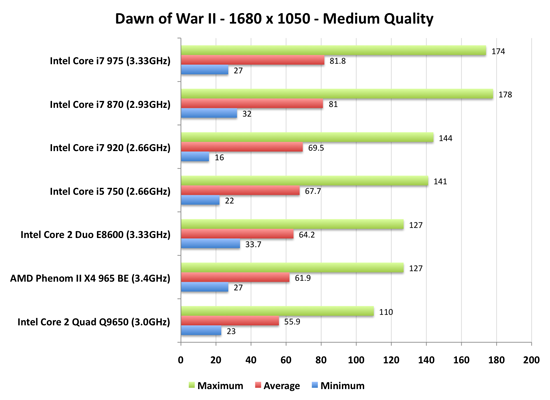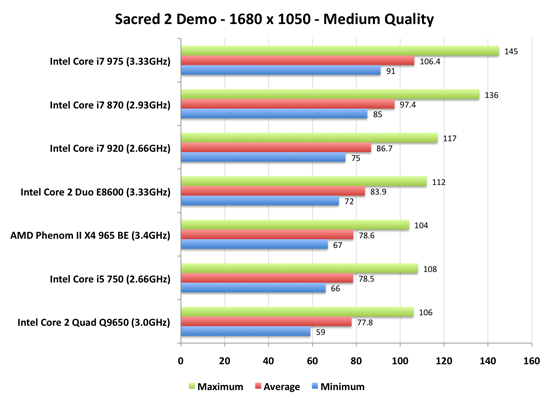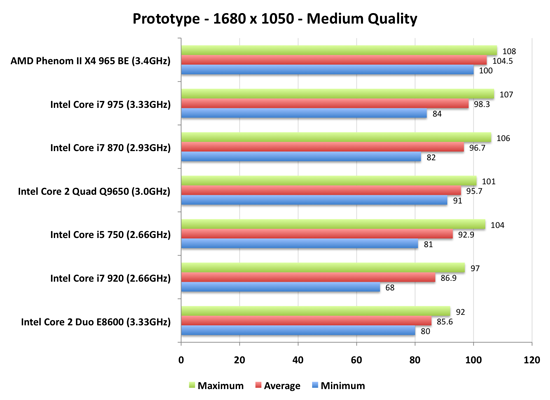Intel's Core i7 870 & i5 750, Lynnfield: Harder, Better, Faster Stronger
by Anand Lal Shimpi on September 8, 2009 12:00 AM EST- Posted in
- CPUs
The Best Gaming CPU?
When I first previewed Lynnfield I theorized that its aggressive turbo modes would make it the best gaming CPU on the market. Most games these days use between two and four threads, not enough for Hyper Threading to be truly beneficial. As a result, Nehalem never really did all that well in games. It was generally faster than the competition, but not much and not on a performance-per-dollar basis.
I ran a few new game tests under Windows 7 to accompany our usual game benchmarks. The competitors here are limited to Lynnfield (of course), Bloomfield, Penryn and AMD's Phenom II.

Dawn of War II doesn't actually shatter any expectations. While turbo clearly benefits Lynnfield, it isn't enough to dethrone Bloomfield. The Core i7 920 is marginally faster than the new i5 750. Here's where things get interesting though: look at minimum frame rates. In both Lynnfield platforms, the minimum frame rates are higher than the competing Bloomfield system. That appears to be Lynnfield's aggressive turbo modes at work. While they're not constantly pushing Lynnfield to a higher clock speed, they do apparently help out when it matters the most.
The other thing to notice is the lowest Lynnfield is a faster gaming CPU than Intel's fastest dual-core: the E8600.

Sacred 2 is an example of performance standings in a more normal manner. Lynnfield can't seem to outperform Bloomfield, and the Core i5 750 actually falls slightly behind AMD's Phenom II X4 965 BE.

With World of Warcraft we're back to turbo mode having a very positive impact. The Core i7 870 is nearly as fast as the i7 975, while the i5 750 is a bit slower than the i7 920. Both are faster than the Phenom II X4 965 BE, which is in turn faster than the Q9650.
These three benchmarks seem to outline the three most realistic options for Lynnfield's gaming performance. In situations where its turbo modes can work, Lynnfield can be equal to if not faster than Bloomfield. In those situations where it doesn't kick in, Lynnfield is at least competitive with Phenom II and Bloomfield. In all situations the old Core 2 Quad Q9650 is at the bottom of the charts.
I'll throw in one more option just to complicate things. Have a look at this:

Not exactly the norm, but here we have the Phenom II X4 965 BE faster than everything - including the Core i7 975. Unfortunately there's no one benchmark that will sum up how these things perform, but overall it looks like Lynnfield is going to be one capable gaming CPU.










343 Comments
View All Comments
Shadowmaster625 - Tuesday, September 8, 2009 - link
Intel releases yet another new socket type, offering negligible performance enhancements vs socket 775. Soon they will obsolete another socket type still in use. And this is a good thing? I'm still dealing with the fallout from the socket 478...DJMiggy - Tuesday, September 8, 2009 - link
Thanks! Some good info! Now to decide what to do...Rabman - Tuesday, September 8, 2009 - link
Full disclusre -- I work for AMD, my comments are my own and do not reflect my employer, etc.A clarification on Windows 7's Core Parking feature -- it doesn't actually "[look] at the performance penalty from migrating a thread from one core to another". Rather, Core Parking was designed as a power saving feature for multi-core server machines, and is only enabled on Windows 7 client SKUs where HT is present (I won't get into specifics as to why this decision was made). The side benefit for processors with HT is that the hyperthreads can be parked so the Windows scheduler will spread threads across the "real" cores first, resulting in better performance characteristics.
rbbot - Tuesday, September 8, 2009 - link
That implies that it would have a negative effect on the chances of turbo mode engaging. On other OS, pure random chance would sometimes assign a waking thread to the hyper-core of the one already executing at full pelt. However, this means that on Windows 7, core parking prevents this happening and always wakes a 2nd core for the 2nd thread.puffpio - Tuesday, September 8, 2009 - link
If you disable turbo mode, will the individual cores still power down when unused?Take the 860 for example. With turbo mode enabled you get these overclocked speeds:
3C/4C Active: 3.54GHz
2C Active: 3.85GHz
1C Active: 4.00GHz
but with turbo mode disabled you get 3.99GHz at 1/2/3/4 cores active.
If the cores are still able to be powered down w/ turbo mode disabled, it would seem that would give you the best performance at any core activity level.
Comdrpopnfresh - Tuesday, September 8, 2009 - link
Specifically; power consumption, efficiency, and productivity/performance. On the consumer scale though- obviously with single-cpu boards benches geared towards commercial use would be droll.AFUMCBill - Tuesday, September 8, 2009 - link
Great Review.You mentioned the rising popularity of the uATX platform.
I would guess this is related to the rising popularity of laptops.
Except you can't find anything close to the performance of a Core i7 or i5 processor in a laptop form factor at anything remotely resembling a reasonable price - as in thousands and thousands of dollars extra. So people are headed to the uATX platform and the small(er) LAN party type boxes to get mobile performace. In my case I would like to be able to load high bitrate (25 Mbps and up) MPEG2 and MPEG4 footage into my video editor and have at it. My Q6600 handles the MPEG2 fine, but not the MPEG4 (AVCHD).
Found the Core i7 860 available at MicroCenter for $229.99 USD.
For me to make the buy, the only thing that is missing is USB 3.0.
Next year is looking good...and prices are likely to be even lower then :-)
Peroxyde - Tuesday, September 8, 2009 - link
Just checked at Newegg. Is there any error on the price? The newer and more performance i5 750 costs $209. The Q9550 cost $219. That sounds illogical.AFUMCBill - Tuesday, September 8, 2009 - link
I think it's called having old stock that was purchased before the new announcements. Obviously the folks they are going to be selling to are ones who are updating the processor in an older 775 socket motherboard based system - which with the new announcements are now rapidly receding into the past.C'DaleRider - Tuesday, September 8, 2009 - link
Sucks to have to depend on Newegg for buying, esp. considering what MicroCenter is doing. $199 for the i7 920 while Newegg gouges at $279, or the i5 750 for $179.Newegg long ago ceased being the place for the best prices.